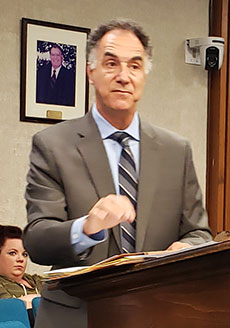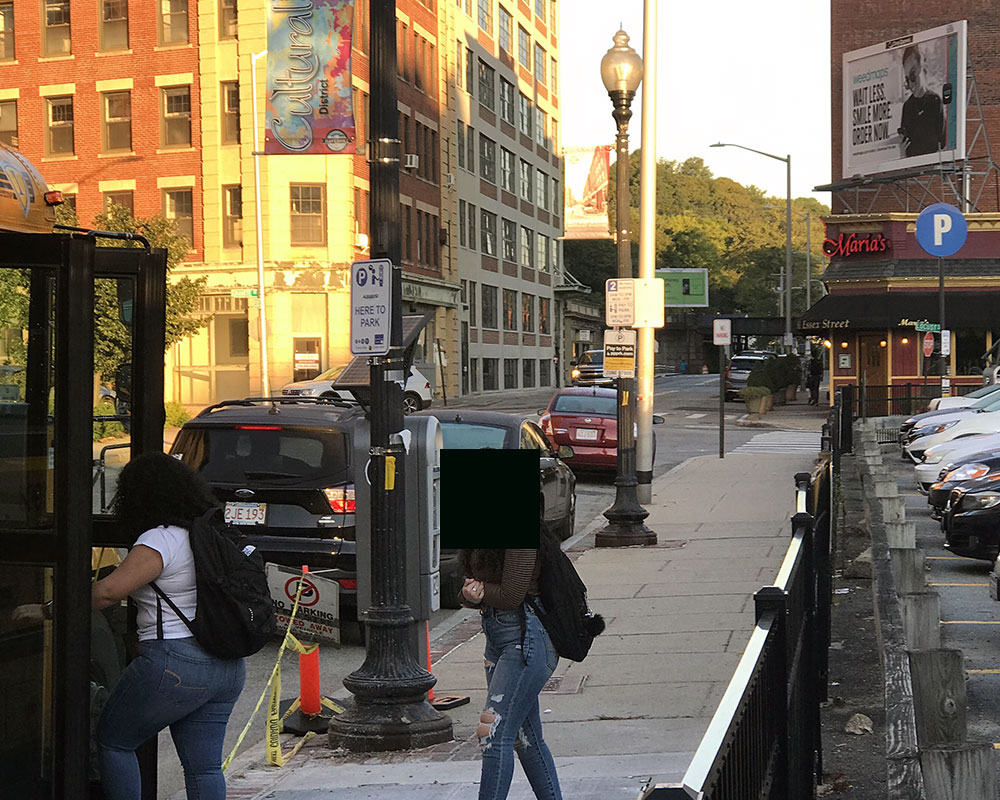Haverhill city councilors are asking why children are not allowed to see a cartoonish “Joe Camel” on roadside billboards, but may see ads promoting marijuana use.
Councilor Colin F. LePage and representatives of the Massachusetts Prevention Alliance Tuesday night called for the city to restrict such advertising, especially where it could be aimed at the young. LePage made his point by displaying a photograph of an actual downtown Haverhill billboard that promotes a smartphone app aimed at helping people find and buy marijuana. The image showed Haverhill students boarding a school bus just below the billboard.
“That’s a Whittier Tech bus. That’s also the bus stop and route for the Haverhill High School, Nettle, Golden Hill and Bradford Elementary students. What should we do?” LePage asked.

Attorney John Sofis Scheft, associated with the Massachusetts Prevention Alliance, addresses Haverhill city councilors. (WHAV News photograph.)
LePage, school pediatrician John L. Maddox and Attorney John Sofis Scheft said current state law prohibits marijuana advertising unless at least 85 percent of the audience is reasonably expected to be at least 21 years old. They asked the city adopt its own regulations since few, if any, places exist in Haverhill where young people are not present.
LePage noted how advertising of tobacco products—especially those aimed at youngsters—has been restricted. Researchers, for example, linked the “Joe Camel” advertising to a substantial increase in youth smoking and ads were withdrawn by court settlement. Scheft noted such promotion has long been regulated.
“I don’t think the first amendment issues here are anything you need to worry about because we have a long legacy in this country of allowing content-based regulation of advertising addictive substances beginning with cigarettes and alcohol and now commercial cannabis,” Scheft said.
In a handout, Scheft noted state law already allows communities to regulate “public sign” language. He warned local regulations cannot be inconsistent with state rules or more restrictive than alcohol sign regulations.
City Solicitor William D. Cox Jr., however, cautioned councilors that jurisdiction may rest with the state’s Cannabis Control Commission. He noted the Commission may not be able to regulate phone app advertising since it is not directly paid for by licensed marijuana businesses. Further, he added, it is the state that regulates outdoor billboards. He advised the council to delay advertising regulations until he consults with the Commission.
Councilors, on a motion by Councilor William J. Macek and seconded by Councilor Melinda E. Barrett referred the matter to its Administration and Finance Committee for study. Also voting in favor were Council President John A. Michitson, Vice President Thomas J. Sullivan and Councilors LePage and Timothy J. Jordan. Councilor Joseph J. Bevilacqua opposed the study delay.
“I don’t think we can bar the advertisement. I wish I were wrong, but the reason why is the Cannabis Control Commission is an advocate. They’re not a regulator,” Bevilacqua charged.
Councilor Mary Ellen Daly O’Brien was absent and Councilor Michael S. McGonagle excused himself since he may be renting property to a planned marijuana retail store.
